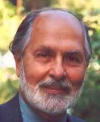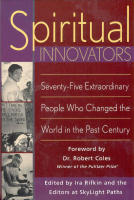|
Seyyed Hossein Nasr, currently University Professor of Islamic Studies
at the George Washington University, Washington D.C. is one of the most
important and foremost scholars of Islamic, Religious and Comparative Studies
in the world today. Author of over fifty books and five hundred articles
which have been translated into several major Islamic, European and Asian
languages, Professor Nasr is a well known and highly respected intellectual
figure both in the West and the Islamic world. |
|
Each of the ClickToSee websites below opens in a new window.
When done, close new window to return to this page. |
 |
This is the site of The Seyyed Hossein Nasr Foundation, which gives his Biography, Aim and a list of Resources. |
 |
Beacon of Knowledge - a Conference Honouring Professor Seyyed Hossein Nasr. This was a celebration
of his life and works at George Washington University in November 2001.
It is worth review to see his great influence in teaching three generations
of scholars, and skim the abstracts of papers delivered. |
 |
A rather excellent and brief bio of the professor from the site above. |
 |
Here's a link from the book, to the site of The Foundation for Traditional Studies, which espouses the "perrenial philosphy" of Nasr. "Through its programs the Foundation seeks to make known the principles
and philosophies at the heart of various traditions and to provide access
in a variety of ways to their religious practices, arts, sciences, and
social structures." |
 |
The introduction of his book Science and Civilization in Islam 1968. (from Forham University) |
|
|
|
| More Quotations |
|
"In this brief introduction, it has been necessary to cover much ground
that is unfamiliar and often quite difficult for a Western reader to grasp.
But we felt that we had to dispel the common conception of the Muslims
as merely Puritan warriors and merchants, whose strange bent for the "subtleties"
of algebra and logic somehow also enabled them to become the transmitters
of Greek learning to the West. As against that all too current notion,
we have tried to present a brief picture of a culture whose spiritual values
are inextricably tied up with mathematics and with metaphysics of a high
order, and which once again fused the constituent elements of Greek science
into a powerful unitary conception, which had an essential influence on
the Western world up to the time of the Renaissance.
Strangely enough, it is this latter conception, half unknown at best, and
then quickly forgotten in the Wcst, which has remained, up to the present
Western impact upon the Islamic world, the major factor in the Islamic
perspective determining its attitude toward Nature and the meaning it gives
to the sciences of Nature; conversely, it is those very elements of the
Islamic sciences, most responsible for providing the tools with which the
West began the study of the already secularized Nature of the seventeenth
century, that became secondary in the Islamic world itself and had already
ceased to occupy the main intellectual efforts of that civilization by
the ninth/ fifteenth century.
The Western world has since concentrated its intellectual energies upon
the study of the quantitative aspects of things, thus developing a science
of Nature, whose all too obvious fruits in the physical domain have won
for it the greatest esteem among people everywhere, for most of whom "science"
is identified with technology and its applications. Islamic science, by
contrast, seeks ultimately to attain such knowledge as will contribute
toward the spiritual perfection and deliverance of anyone capable of studying
it; thus its fruits are inward and hidden, its values more difficult to
discern. To understand it requires placing oneself within its perspective
and accepting as legitimate a science of Nature which has a different end,
and uses different means, from those of modern science. If it is unjust
to identify Western science solely with its material results, it is even
more unjust to judge medieval science by its outward "usefulness"
alone. However important its uses may have been in calendarial work, in
irrigation, in architecture, its ultimate aim has always been to relate
the corporeal world to its basic spiritual principle, through the knowledge
of those symbols which unite the various orders of reality. It can only
be understood, and should only be judged, in terms of its own aims and
its own perspectives." .. Science and Civilization in Islam.
|
|
"The function of religion is to bestow order upon human life and to
establish an "outward" harmony upon whose basis man can return
inwardly to his Origin by means of the journey toward the "interior"
direction." ... The Interior Life in Lislam
|
|
"The challenges which I put before this audience today are, I believe,
among the most important that must be confronted in future relations between
religions because we cannot evade the following realities: First, there
is a major environmental crisis. Second, the religious element in the environmental
crisis is extremely important. Third, the vast majority of the peoples
of the world are still religious, and if a mullah tells somebody in a mosque
not to pollute the water, it will have a lot more effect than the government
publishing an article about it in a newspaper in Cairo, Damascus or Tehran.
The fact is that we all live on the globe within a web of life and an ecological
system now being threatened with destruction through the manner in which
we live. Therefore the question of interfaith dialogue and the relation
between religions must also encompass this very important dimension, that
is, this attitude toward God's creation. Without consideration of this
reality, there will never be concrete unity of life of human beings and
other creatures or any kind of peaceful existence and we will in fact only
have the negative unity of joining forces to destroy the earth together,
leading to our own destruction." ... from a paper delivered at Oxford
in 1994, The Relation Between Religions in the Shadow of the Environmental
Crisis. Click HERE to read whole paper.
|
|
|
|



